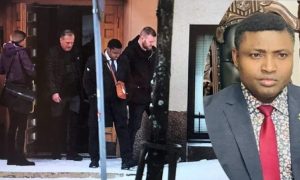
Finnish authorities have arrested Simon Ekpa, a prominent Biafran separatist leader and self-proclaimed “Prime Minister” of the Biafra Republic Government in Exile, on charges of inciting terrorism.
The arrest, made earlier this week, marks a significant development in the ongoing international scrutiny of Ekpa’s separatist activities, which have had far-reaching consequences both in Finland and in southeastern Nigeria. Ekpa, alongside four other men, faces accusations of promoting violence and terror through social media, ultimately contributing to unrest in Nigeria’s South-East region.
Background to Ekpa’s Arrest:
The 40-year-old Ekpa, who also serves as a municipal politician in Lahti under Finland’s National Coalition Party (NCP), has long been a controversial figure due to his role in advocating for the secession of the Biafran region from Nigeria. He rose to international prominence as a leader of a faction within the Indigenous People of Biafra (IPOB), a proscribed separatist group. Despite his political position in Finland, Ekpa’s primary focus has been on inciting violence and disrupting order in southeastern Nigeria, a region still grappling with the aftermath of the 1967-70 Nigerian Civil War, which saw the Biafran state attempt to break away from the country.
The Finnish National Bureau of Investigation (NBI) arrested Ekpa on suspicion of using his online platform to incite crimes with terrorist intent. In particular, he is accused of directing violence against Nigerian civilians and security forces, including promoting a violent boycott of Nigerian elections and advocating for the use of force against the Nigerian government. Ekpa’s call for the “boycott” of the 2023 general elections, along with his justification of violence as “self-defense” against alleged Nigerian military war crimes, has raised alarms internationally.
Charges and Investigation:
According to the NBI, Ekpa’s activities were not only based in Finland but also coordinated from there, where he allegedly used his social media channels to inspire terrorist acts in Nigeria. “This activity has been carried out, among other means, via social media channels,” said Detective Chief Inspector Otto Hiltunen. Ekpa is also accused of financing and facilitating terror-related activities in collaboration with four other individuals. The Finnish police confirmed that all five men have been arrested, with the investigation focusing on allegations of financing terrorism and promoting violence that has targeted both civilians and government institutions in Nigeria.
Reports from Finland indicate that the arrests occurred after a thorough investigation, which involved international cooperation between Finnish authorities and other global law enforcement agencies. The Päijät-Häme District Court has now remanded Ekpa in custody, where he is facing charges related to “public incitement to commit a crime with terrorist intent.”
A Divisive Figure in Biafra’s Struggle:
Simon Ekpa’s actions have deepened the already volatile situation in southeastern Nigeria. His leadership of the faction within IPOB is marked by extreme tactics that include enforcing a sit-at-home order every Monday in the region. This illegal order has led to widespread economic disruptions, as residents, fearing violence, comply with the directive, halting business activities and crippling local economies. Ekpa’s separation from IPOB’s original leadership under Nnamdi Kanu has only intensified the conflict. While Kanu advocates for diplomatic routes to Biafran independence, Ekpa’s approach has become more radical, with calls for violence and insurgency as means of achieving secession.

Ekpa’s faction has, at times, been linked to armed groups that target Nigerian security forces and government officials in the southeastern region. He has made public statements in which he justifies violence against the Nigerian government, framing it as a defensive response to what he claims are war crimes committed by the state. His rhetoric has led to further instability in a region already battling militancy, kidnappings, and violent clashes between separatists and the Nigerian military.
Nigeria’s Efforts for Extradition:
The Nigerian government has long sought to extradite Ekpa to face charges in Nigeria, accusing him of inciting terrorism and destabilizing the South-East. These efforts have been unsuccessful thus far, as Finnish authorities have allowed Ekpa to continue his activities in the country, citing legal protections under Finnish law. However, the latest arrest marks a shift in Finland’s stance.
While Nigeria continues to press for his extradition, the arrest signals a growing willingness by Finnish authorities to hold Ekpa accountable for actions that extend beyond his political position in Lahti. The Nigerian government has previously expressed frustration with Finland’s inaction, alleging that the European nation, along with the European Union, has indirectly supported Ekpa’s destabilizing activities. The Nigerian authorities view these activities as a direct threat to national security and sovereignty, particularly as they relate to the ongoing insurgency in the South-East and the rising toll on civilian lives.
Global Reactions:
International reactions to Ekpa’s arrest have been mixed. Human rights organizations have been cautious in their comments, expressing concern over the potential use of counter-terrorism laws to stifle political dissent. However, the larger international community, particularly African nations and experts on regional security, have largely supported Finland’s actions. They argue that Ekpa’s leadership in inciting violence against civilians and security forces, coupled with his promotion of secessionist violence, presents a clear threat to both Nigerian stability and the peace of the broader West African region.
The arrest of Ekpa and his associates raises critical questions about the role of diaspora activism in fueling violent separatism, and the responsibilities of host countries in managing foreign political figures involved in international conflicts. It also highlights the complex dynamics of international law, where the right to free speech often clashes with actions that endanger public safety and undermine national sovereignty.
Conclusion:
Simon Ekpa’s arrest in Finland represents a significant moment in the ongoing struggle for Biafran independence, as well as in the broader fight against terrorism and separatism in Africa. His activities, including the incitement of violence and terror in Nigeria’s South-East, have contributed to a rising climate of instability that has affected both local communities and the national government. While Ekpa’s arrest is a blow to the separatist cause, it also raises important questions about the limits of political activism in the context of global security. As Finland prepares to address the charges in court, the outcome of this case will be closely watched, not only by those invested in the Biafran cause but also by international policymakers concerned with the intersection of diaspora politics, terrorism, and state sovereignty.

